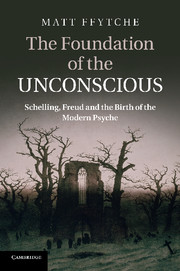Book contents
- Frontmatter
- Contents
- Acknowledgements
- Introduction: the historiography of the unconscious
- Part I The subject before the unconscious
- Part II The Romantic unconscious
- 3 Divining the individual: towards a metaphysics of the unconscious
- 4 The historical unconscious: the psyche in the Romantic human sciences
- 5 Post-idealism and the Romantic psyche
- Part III The psychoanalytic unconscious
- Bibliography
- Index
- References
4 - The historical unconscious: the psyche in the Romantic human sciences
Published online by Cambridge University Press: 05 December 2011
- Frontmatter
- Contents
- Acknowledgements
- Introduction: the historiography of the unconscious
- Part I The subject before the unconscious
- Part II The Romantic unconscious
- 3 Divining the individual: towards a metaphysics of the unconscious
- 4 The historical unconscious: the psyche in the Romantic human sciences
- 5 Post-idealism and the Romantic psyche
- Part III The psychoanalytic unconscious
- Bibliography
- Index
- References
Summary
We will now enter the way of times …
[T]he true in history is not in the present …
The last chapter concentrated on Schelling the metaphysician. It explored the way in which he wrestled with notions of the system, of ‘wholeness’ and the ‘absolute’, in an attempt to make them permeable or even subservient to ideas of selfhood, individuality and freedom. Ultimately, in order to secure these terms of freedom and self-development, he shifted decisively away from idealist apprehensions of objectivity and casual connection, towards a paradigm in which the ‘absolute’ was necessarily and foundationally displaced from presence (though somehow also operative within it) being either latent within the world or obscurely beyond it. This move effectively establishes an idealism of the unconscious. But in the Ages of the World, the latent and the beyond are also both modes of the book’s explicit subject, time: latency as the past or as the future still to arrive. The opening of the text itself attempts to make a new start in metaphysics by revealing it to be a mode of historical inquiry: ‘Why … has it been impossible until now that philosophy – which is history with respect to its name and content [that is, ‘history’ from Greek ιστορια, knowing by inquiry] – be history with respect to its form as well?’
If Schelling’s interest in the genesis of life proved to have ulterior motives, so his concern with the past and history is not historical in the usual sense of the term. Schelling was not interested in gathering historical information about either the progress of civilisation or the organic differences between civilisations and epochs, and though his later philosophy of the 1840s centred on a structural investigation of classical and pre-classical mythology, its motive, as we shall see, was not strictly historiographical. Indeed, the psychiatrist and existentialist philosopher Karl Jaspers, in his major study of Schelling, gave a shortlist of methodological implications of the term ‘history’ which were absent from Schelling’s work. These include ‘historical knowing of the world’ and ‘the possibility that something that becomes historically lost, can become present again’.
- Type
- Chapter
- Information
- The Foundation of the UnconsciousSchelling, Freud and the Birth of the Modern Psyche, pp. 138 - 177Publisher: Cambridge University PressPrint publication year: 2011



